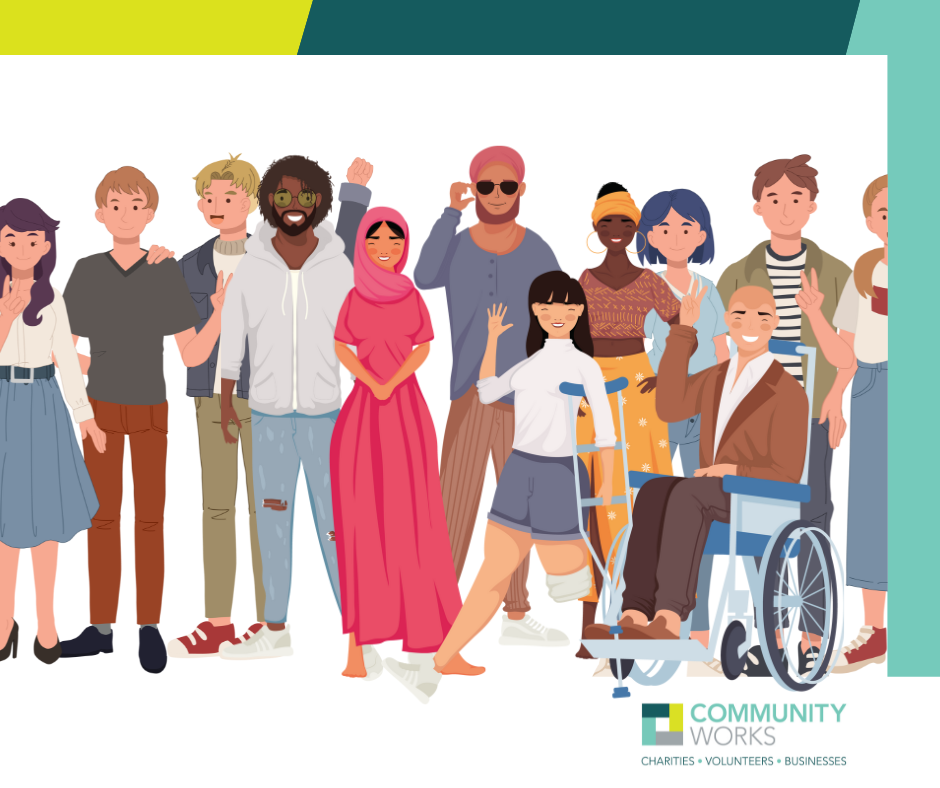How to develop allyship
Community Works is pleased to be involved in NAVCA’s Allyship Champions programme and keen to share the learning with our members. Here’s some information to help you consider how to build allyship principles into your broader Equity, Diversity and Inclusion work.

What is an ally?
An ally is a person from one social identity group who speaks up in support of members of another group. This is typically a member of a more socially privileged group speaking up for a community that is being treated unjustly or discriminated against e.g. White people speaking out in support of Black and Brown people; Cis people standing up for Trans, Non-Binary and/or Intersex people; men standing up for women; Non-Disabled people standing by Disabled people… It goes beyond being sympathetic or empathic to a willingness to speak out to end injustice and discrimination.
Why is allyship important?
Allyship helps to create more a supportive and inclusive culture. It helps to create spaces where people feel able to be themselves, to express their needs and challenges and to feel supported. This includes people feeling welcome, safe, seen and heard in their jobs, volunteering roles and when accessing services.
Allyship also helps to challenge discrimination and prejudice and the underlying systems of oppression. More allyship means more people who are willing to speak up in support of equity and inclusion and to create change.
How to be an ally
- Reflect on your own thoughts, beliefs and actions and challenge your own prejudices. Understand the social privileges and advantages you have because of aspects of your identity and experience. This can be an uncomfortable process.
- Learn more about the community or communities you’d like to be a better ally for. This means doing your own reading, research and thinking to understand the key issues and challenges people with different identities face. This will include the impact of being discriminated, harassed and excluded. Attend events where minoritised communities are speaking and sharing their experiences. ‘Do your own work’ rather than asking people and communities to educate you on their experiences.
- Within an organisation, individual staff members could take responsibility for developing allyship for different communities. You could provide time for sharing the learning and developing practical actions. Be mindful of how people from discriminated-against groups might feel in these conversations and how they can be safely facilitated.
- Confront your own practices by examining your policies, procedures and organisational culture to ensure they are inclusive and supportive of diverse communities. This can include recruitment and progression, EDI, service delivery, events, office conversations… Take notice of feedback you receive from people and communities and consider the changes you can make in response.
- Notice when and how discrimination, harassment and exclusion take place. Develop the confidence to point out that it is happening and/or speak up to prevent it happening. You can do this by taking small actions e.g. if organising an event, use your learning and allyship to help colleagues think through the barriers for specific communities and how they can be overcome; if a staff member or user of your service makes a discriminatory statement, you could refer them to your policies and/or challenge them to think differently about what they’d said.
- Allow people to speak up for themselves first and act in solidarity. Ask people if they are ok and what kind of support they need. Create opportunities and help them to achieve their goals. Pay them for their input and time. Step in to support them and stand in if they are absent from the conversation. Amplify their voices by repeating their experiences and taking forward their requests for change.
As a result of reading this, what can you do within your organisation to show allyship?
If you’d like further support on developing allyship within your organisation, and improving your EDI practices, please get in touch with us at info@communityworks.org.uk.